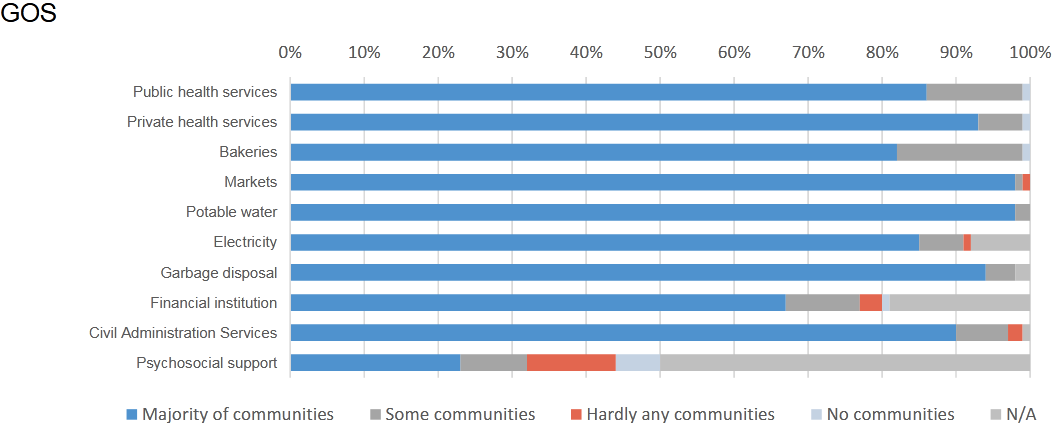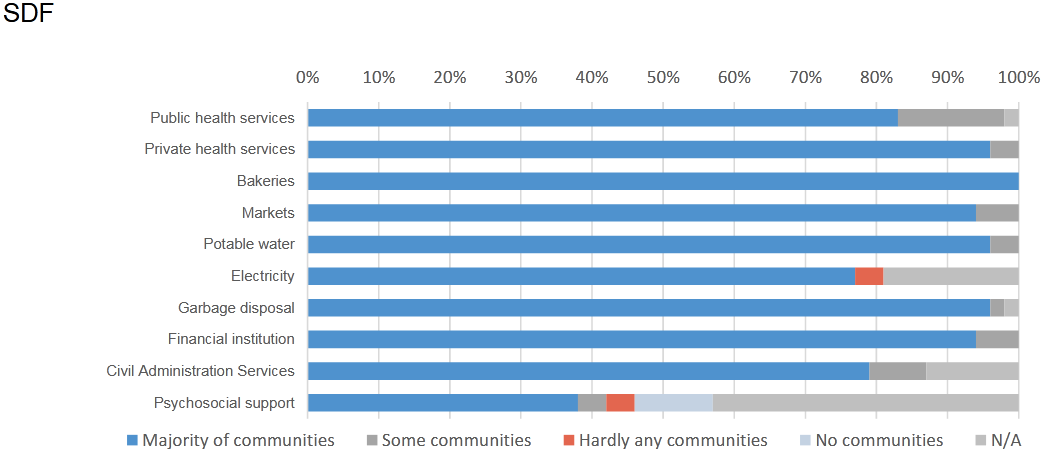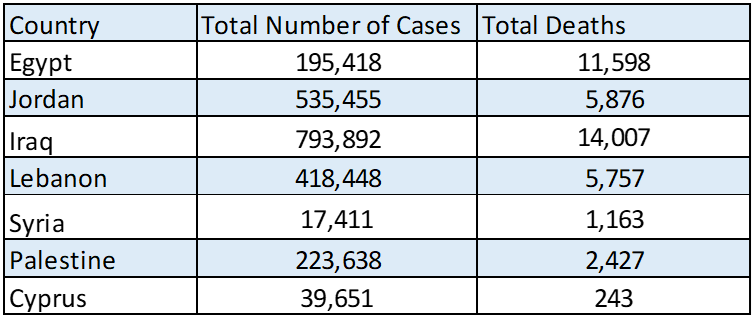MECC Coronavirus (COVID 19) Weekly Report
SYRIA: COVID-19
Humanitarian Update No. 52
Reporting period: from 15 to 21 March 2021
Coronavirus cases: 17240 Active cases: 4584 Recovered: 11503 Deaths: 1153 [1]
Highlights
In GoS-controlled areas of the country,(as of 20 Mar), the Syrian Ministry of Health (MoH) reported 17240 Laboratory-confirmed cases, 1153 fatalities, and 11503 Recoveries.
17240 laboratory-confirmed cases have been reported by the Syrian MoH : 3681 in Damascus; 2705 in Lattakia; 2410 in Aleppo; 2352 in Homs; 1729 in Rural Damascus; 1325 in Tartous; 977 in Dar’a; 915 in Sweida; 734 in Hama; 297 in Quneitra; 72 in Deir-Ez-Zor; 36 in Al-Hasakeh and 7 in Ar-Raqqa.
In NES, as of 16March, there have been 8,743confirmed cases of COVID-19. Of these, 6,112are recorded as active, 2,195have recovered, and there have been 435 deaths. As of 16 March, 787of the total confirmed cases of COVID-19 (9per cent of all cases) were recorded amongst health workers, with the highest recorded in Al-Hasakeh Governorate.
In northwest Syria (NWS), 21,072 cases of COVID-19 have been reported as of 16 March. The total number of cases from IDP camps are 2,214 (10.5per cent). Of all cases,1,849 (8.7per cent) are from health care workers (physicians, dentists, nurses, midwives, pharmacists and various medical technicians), and another 869 (4.1per cent) are other staff working in healthcare facilities/community health workers.
Preparedness and response
To date, local authorities have informed humanitarian partners of 32 identified quarantine facilities and 50 isolation spaces in 13 governorates. At the central level, the MoH has announced 21 isolation centres are currently running, with a cumulative capacity of 1,144 beds, including 934 isolation beds, 210 ICU beds, and 185 ventilators. The 32 quarantine centres are reported to have 5,182 beds.
In NWS, in the reporting period, WHO is designing a Knowledge, Attitude and Practices(KAP)survey that includes the field plan and the data collection instruments Currently, the data collection tools are being translated and formatted to electronic forms and making the necessary preparations for training of the data collection team. With concerns that there may be resistance experienced in the roll-out of the COVAX vaccine, coordination is ongoing between local authorities, IOM, and NGOs to prepare and produce accountability to affected populations (AAP) videos, posters, and any other possible contents related to the COVAX in NWS.
Currently,1,360 sentinel sites report cases through the Early Warning, Alert and Response System(EWARS)system
During the reporting period, more than 2,063 suspected COVID-19 cases were investigated properly within 24 hours. In addition, WHO supported the transport of 450 specimens of suspected cases to the central laboratories.
WHO supported two workshops for 50 participants to enhance preparedness and response capacity of PoEs, including specifically on IPC measures and risk communication.
During the reporting period, NES maintained the highest rate of open internal transit points in Syria since September 2020. Over the course of the response there has been little focus on Point of Entry (PoEs) by actors engaging in COVID response in NES. However, as COVID cases rise around the region and there are increased cases of new variants, it would be of benefit for organizations to offer health staff training at PoEs to screen travellers, and to refer for testing any person who is symptomatic of COVID-19 or has a high temperature.
WHO supported a meeting on the national testing strategy for COVID-19 and the plan for public laboratory expansion. WHO further supported the MoH in plans to conduct a serological epidemiological survey scheduled for March, including a workshop for protocol development and training for healthcare workers.
WHO dispatched over 55,000 PPE items to partners in Aleppo and in Qamishli, with the latter including for isolation centres.
Infection prevention and control (IPC) specialized training was delivered to eight Community-Based Treatment Centres (CCTCs) covering 312 medical and non-medical staff. Currently, WHO is in process of extending its support to the IPC project for a further six months.
WHO supported training for 100 health workers including on immediate life support and ventilator management in Damascus, Tartous, and Lattakia. Further, WHO provided 192,869 treatments of lifesaving medicines to partners in Aleppo, Al-Hasakeh, Deir-Ez-Zor, Damascus, Lattakia and Homs, including for COVID-19 cases.
In NWS, In the reporting period the intensive care unit provided treatment for 54 critical care patients including 15 confirmed COVID-19 cases and the 39 suspected cases with severe symptoms and underlying medical conditions.
During the reporting period, there have not been significant reported logistics constraints in relation to NES and NWS. The NES Forum has confirmed that medical equipment and PPE have been able to be brought into NES without significant disruption. One partner was able to import significant testing supplies, and a second partner brought in a large shipment of PPE materials recently without significant delay. Access discussions are ongoing related to the roll-out of the vaccine program under COVAX. The vaccines program is planned to be coordinated with cross line actors. In NWS, the Logistics Cluster is continuing to work with its partners to identify the cold-chain warehousing and transportation capacity available in northwest Syria for the roll-out of the COVID-19 vaccination campaign.
Annexes
STATUS OF BASIC SERVICES (Source: HNAP as of 16 March 2021 / Proportion of sub-districts with access to the below services:)
[1] Microsoft power MOH,6 March 2021
Lebanon: COVID-19
Humanitarian Update No. 49
Reporting period: from 16 to 22 March 2021
Coronavirus cases: 439,568 Deaths: 5,757 Recovered: 343,099
Highlights
Corona-related statistics from the WHO
The General Director of Rafic Hariri Hospital, Firas Abyad Photo credit: LBC
During this reporting period, the average number of cases dropped to 3,592.
Despite the drop in cases, the General Director of Rafic Hariri Hospital, Firas Abyad, warned that the loosening of lockdown measures is dangerous specially when hospitals are over encumbered and vaccine rollout is still very slow.
Based on the approval of the Council of Ministers, the Ministry of Communications announced that the hotlines for Covid-19 will be free of charge.
The Director of the National Security Fund decided to decrease the tariff for testing for corona. As such, the tariff 150,000 LL was dropped to 100,000 LL.
The Brazilian government, for the second time, dispatched a donation to Lebanon. It included portable oxygen devices and medical reagents for PCR examinations.
The Minister of Public Health announced that it supports private sector companies trying to get the Russian and Chinese vaccines. It does so by giving them permission to negotiate with more than thirty pharmaceutical companies, provided that the vaccine is given to citizens free of charge.
The Minister of Education and Higher Education announced that it has been agreed to open schools starting from March 22, 2021.
The Public Housing Corporation announced that it will close its doors starting from Wednesday morning, March 17, due to the infection of a number of its employees with the Coronavirus.
Communication and Public Relations Department







